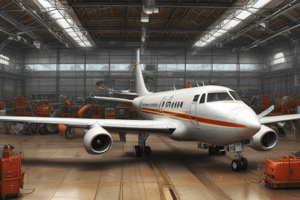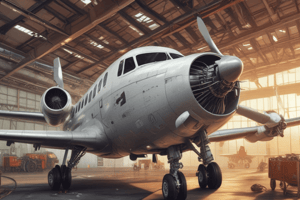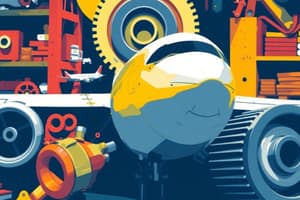Podcast
Questions and Answers
What is the primary role of middle management?
What is the primary role of middle management?
- To perform specific technical tasks
- To directly supervise non-managerial employees
- To manage the work of managers at lower levels (correct)
- To make strategic decisions for the organization
Which of the following is a characteristic of top management?
Which of the following is a characteristic of top management?
- Low-level decision making
- High technical skill
- Strong human relations skills
- High conceptual skill (correct)
What is the primary skill required for first-line managers?
What is the primary skill required for first-line managers?
- Conceptual skill
- Human relations skill
- Technical skill (correct)
- Communication skill
What is a common characteristic of managers' work?
What is a common characteristic of managers' work?
What is a key aspect of managers' communication style?
What is a key aspect of managers' communication style?
What is a characteristic of managers' tasks?
What is a characteristic of managers' tasks?
What is the primary role of operational managers?
What is the primary role of operational managers?
What skill is required for managers to work effectively with others?
What skill is required for managers to work effectively with others?
What is a common activity of managers during meetings?
What is a common activity of managers during meetings?
What is the relationship between managerial levels and skills?
What is the relationship between managerial levels and skills?
Flashcards are hidden until you start studying
Study Notes
Management Requirements
- Management is about getting things done through others, and it requires:
- Objective: something to aim to achieve
- Resources: a source of supply, support, or aid
- Methods: procedure for accomplishing or approaching something
- Organization setting: hierarchy of people with their corresponding decision-making influence
- People: human beings making up a group or assembly or linked by a common interest
Management Aspects
- Other management aspects include:
- Productivity: an index that measures output relative to input
- Effectiveness: the capability of producing an effect (doing the "right" things)
- Efficiency: a measure of how well a certain aspect is performing (doing things "right")
Functions of Management
- Management functions consist of:
- Planning (Decision Making): selecting goals and objectives, as well as the actions to achieve them
- Organizing (Staffing): gathering and allocating resources, coordinating the work of the organization
- Directing (Leading): redirecting human behavior to achieve objectives, motivating others to produce
- Controlling: keeping things on track, steering performance towards desired goals
Planning (Decision Making)
- Involves:
- Selecting goals and objectives
- Deciding what/when/how/who to do things
Organizing (Staffing)
- Involves:
- Gathering and allocating resources
- Coordinating the work of the organization
- Defining authority, communication, and task structures
Directing (Leading)
- Involves:
- Redirecting human behavior to achieve objectives
- Motivating others to produce
- Influencing subordinates
Controlling
- Involves:
- Keeping things on track
- Steering performance towards desired goals
- Coordinating, monitoring, and adjusting performance
Managerial Levels and Skills
-
Management levels:
- First-line managers: directly supervise non-managers
- Middle management: manage through other managers
- Top management: responsible for defining the character, mission, and objectives of the enterprise
-
Managerial skills:
- Conceptual skill: cognitive ability to see the organization as a whole
- Human skill: ability to work with and through other people
- Technical skill: understanding of and proficiency in the performance of specific tasks
Relationship between Levels and Skills
- Top management: requires conceptual skill
- Middle management: requires human relations skills
- Supervisory management: requires technical skills
What Managers Do
- Managers work at an unrelenting pace, with little time for breaks
- Managers handle a wide variety of issues throughout the day
- Managers rely heavily on verbal communication and networks
Studying That Suits You
Use AI to generate personalized quizzes and flashcards to suit your learning preferences.




